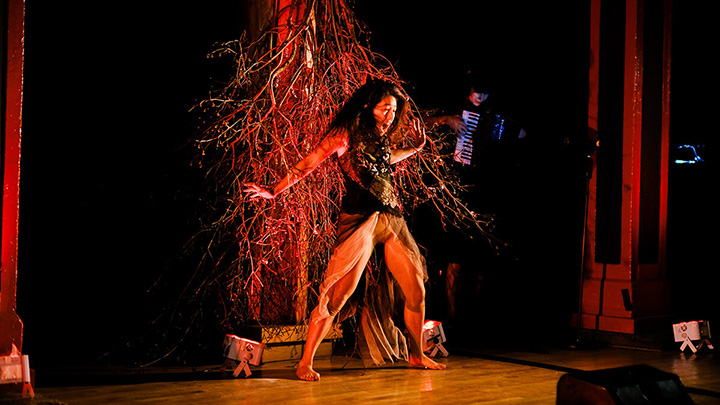The performance begins with an adorable rendition of “Time Warp” from Rocky Horror Picture Show, sung by MC Kim David Smith. The tune is meant literally: the opera-kabarett takes us on a warped journey through time (“in another dimension/ with voyeuristic intention”) with pit stops in World War I, the American Revolution, the Protestant Reformation, the Salem Witch Trials, the Roman Empire, Christ’s crucifixion, and humanity’s fall in the Garden of Eden.
The cabaret begins in Weimar Berlin with Kim David Smith traipsing through the cabaret classics of the era like “Ich bin die Fesche Lola,” “Pirate Jenny,” and “Alabama Song.” The song choices throughout are whimsical, artful, and at times wonderingly weird. Pairing Monteverdi’s “Pur Ti Miro” with Weill’s “The Death of Caesar,” for instance, in The Fall of the Roman Empire, was outright inspired. In “Pur Ti Miro,” Ariadne Greif and Luke Elmer, as Poppea and Nerone, wearing only white sheets, sang while performing soft core pornography. Trilling in baroque fashion while dry humping, Greif and Elmer do on stage what normally only happens in your head while listening to Monteverdi. The athletic piece was sexy and sensual and not entirely performed for laughs: a tribute to Greif and Elmer’s acting skills and strong technical abilities.
Other standout acts were Melina Jaharis singing “Azucena’s Song” from Il Trovatore, Amara Granderson’s stunning performance of Lewis Allan’s “Strange Fruit,” and Aaron Reeder’s passionate “Were You There (When They Crucified My Lord).” Liana Zhen-ai and Dylan Contreras also danced beautifully as Adam and Eve to Richter’s “This Bitter Earth” / “On the Nature of Daylight,” presenting high modern arabesques in perfectly on point Martha Graham style.
The star of the night, in true kabarett fashion, was burlesque performer Pearls Daily performing a strip tease as Jesus Christ. Disrobing while Kim David Smith sang “Nature Boy” by eden ahbez, she kept little on but her beard by the end of the act. Altogether the dancing, strip tease, and dry humping Monteverdi in the second act were true to the spirit of the raunchy, wild, and winsome cabarets of the Weimar period.
Australian singer Kim David Smith is an excellent cabaret MC. He has a prim and succinct singing voice, his vowels pleasantly crunchy. He seems to have one shtick but it’s a good one. His interstitial bits kept the show going at a happy trot. I have no criticism of his performance, but I wondered at the choice of having him perform so much of the repertoire himself, especially when the whole cast of singers was so talented and diverse.
It’s not that his “Pirate Jenny” or “Alabama Song” were badly done, but there was an vanilla sameness to them. This was particularly glaring in “Pirate Jenny,” traditionally a female revolutionary ballad whose performance will always call up Nina Simone or Lotte Lenyalilting and growling through the lyrics. Not that one need be gender essentialist in a Weimar-inspired cabaret, but this famously female cri de coeur just didn’t hit right at Tiergarden.
All in all, despite overreliance on the one performer, Tiergarden was a success. Ousley’s combinations of Weimarkeit, classical music, modern dance, and contemporary song, while rough around the edges, got at the heart and soul of the Weimar. I very much hope he continues to present cabarets and to expand and diversify this repertoire with more political content, dancing, and audience participation.
Photos: Kevin Condon




